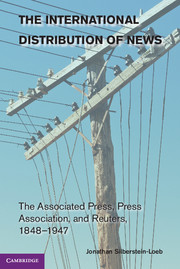 The International Distribution of News
The International Distribution of News Book contents
- Frontmatter
- Dedication
- Contents
- List of Tables
- Acknowledgments
- 1 Introduction
- 2 Conceiving Cooperation among American Newspapers, 1848–1892
- 3 Cooperation, Competition, and Regulation in the United States, 1893–1945
- 4 The “Rationalist Illusion,” the Post Office, and the Press, 1868–1913
- 5 Private Enterprise, Public Monopoly, and the Preservation of Cooperation in Britain, 1914–1941
- 6 Reluctant Imperialist? Reuters in the British Empire, 1851–1947
- 7 Cartel or Free Trade: Supplying the World’s News, 1856–1947
- 8 Conclusion
- Bibliography
- Index
- References
6 - Reluctant Imperialist? Reuters in the British Empire, 1851–1947
Published online by Cambridge University Press: 05 July 2014
- Frontmatter
- Dedication
- Contents
- List of Tables
- Acknowledgments
- 1 Introduction
- 2 Conceiving Cooperation among American Newspapers, 1848–1892
- 3 Cooperation, Competition, and Regulation in the United States, 1893–1945
- 4 The “Rationalist Illusion,” the Post Office, and the Press, 1868–1913
- 5 Private Enterprise, Public Monopoly, and the Preservation of Cooperation in Britain, 1914–1941
- 6 Reluctant Imperialist? Reuters in the British Empire, 1851–1947
- 7 Cartel or Free Trade: Supplying the World’s News, 1856–1947
- 8 Conclusion
- Bibliography
- Index
- References
Summary
The tension between cooperation and exclusion in the supply of news was as pronounced throughout the British Empire as it was in the British Isles and in the United States. To spread costs and increase profits, Reuters, like the United Press in the United States, had an incentive to sell its news as widely as possible, but it too encountered a desire on the part of the press throughout the Empire to possess news exclusively. Colonial and commonwealth administrations regulated this relationship, typically by changes in telecommunications policy or by the allocation of intellectual property rights, and occasionally through judicial intervention and outright financial subsidy. On a daily basis, however, Reuters attempted to moderate the tension between exclusivity and cooperation among newspaper interests throughout the Empire. But, more often than not, access to Reuters’s news reports was used as a bargaining chip in the internecine conflicts between warring factions of the colonial press. As a consequence, Reuters’s news business was never particularly profitable. Before World War I, Reuters developed a private telegram business and associated lines of work to subsidize its newsgathering. After the war, in conjunction with the use of radio, Reuters developed a highly profitable and influential commercial news business. After 1930, the PA, which owned Reuters as a subsidiary, relied on these alternative sources of revenue, and the profits Reuters earned from its news services in the Empire, to offset the cost of international news to the newspapers of the British Isles.
- Type
- Chapter
- Information
- The International Distribution of NewsThe Associated Press, Press Association, and Reuters, 1848–1947, pp. 163 - 195Publisher: Cambridge University PressPrint publication year: 2014


